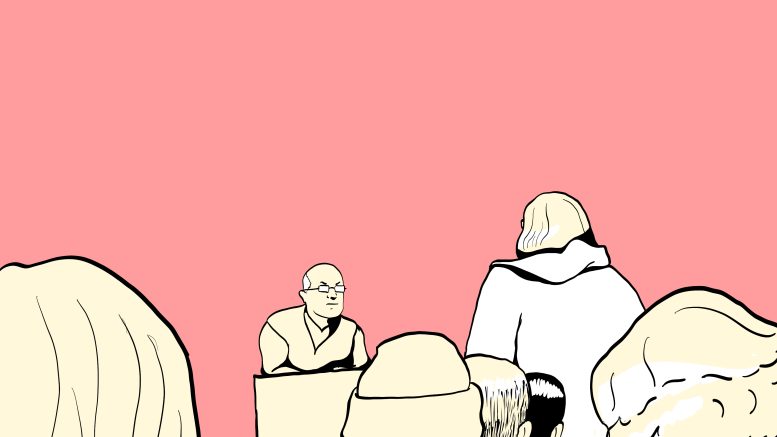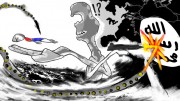Haneen Nakhleh and Belkis Elmoudi attended Bassem Eid’s talk on campus last Monday. Before even walking into the room, they felt unwelcome.
When Nakhleh, her sister Ronia and Elmoudi — who had all registered for the event prior — tried to enter the event, they said campus security had asked if they had registered three separate times.
Security wasn’t the only barrier the three faced before they entered the event. Nakhleh remembers an attendee approaching the three women, asking them if they were going to “cause any problems.” Elmoudi noted that all three wore hijabs. Nakhleh had a keffiyeh on her backpack, which the attendee noticed. They only entered after Nakhleh asked why the keffiyeh would indicate they would cause trouble.
“We walk in, we were given dirty looks,” she recalled. “We took our seats in the back, and just listened.”
During the question period, Elmoudi raised her hand and asked a question, which was delayed to the end by Eid, but before he reached her question, another question was asked, about how Christians, Jews and Muslims can achieve peace. In Eid’s response, he said the major obstacle was “the ideology of Muslims.” He said Muslims are ideologically “not ready to change.”
The three felt as though couldn’t say anything. They said they had been threatened with arrest just before sitting down, but eventually, Elmoudi stood up to tell the audience that what they were hearing was misinformation. Eid raised his voice, telling her to stop talking, and then addressed the audience, saying that “this is the problem of the Muslims.”
The group left soon after another attendee spoke up.
“It made me feel very isolated and very unsafe,” Elmoudi said.
Elmoudi said that, after the event, security services reached out to say Eid’s conduct at the event was “appalling.” The three made clear, though, that the message did not acknowledge security’s behaviour.
U of M said security services was unavailable for an interview, but provided an email statement to the Manitoban which said the onus is on event organizers to engage security services “if they feel security services are needed for the event,” in order to create a safety plan.
The statement also said U of M policies for the space and event are explained to event hosts, drawing attention to the Respectful Workplace and Learning policy, and that the policies apply to everyone in attendance.
The community reacts
A day after the event was held, Elmoudi took to social media to share her story. She was flooded with comments of support, with many calling to hold UMSU and the University of Manitoba accountable for allowing the event to be held on campus.
While the talk was held at the U of M, both UMSU and the university emphasized in email statements to the Manitoban that they were not involved with its organization. The event was organized by the groups Students Supporting Israel (SSI) and Bridges for Peace, with funds from the Asper Foundation.
Eid — referred to on posters promoting the talk as a “Palestinian peace activist, human rights expert, political analyst and journalist” — spoke at the U of W earlier that day. That event was presented by Bridges for Peace and Jewish Community on Campus, assisted again by the Asper Foundation.
When asked why SSI invited Eid to speak on campus, SSI U of M president Tomer Hatzir and SSI founder and international president Ilan Sinelnikov said in an email that they “were unaffiliated” with the original event in which Eid came to speak. The two did not take responsibility for inviting him — nor did SSI U of M collectively on its Instagram statement. They said he came to the U of M because of his perspective as “someone who identifies as a Palestinian Muslim peace activist.”
The two suggested that Eid’s comments were a result of “verbal abuse” that took place at the talk, and said that no similar comment had been made by Eid at the U of W or anywhere else.
Hatzir and Sinelnikov said in their email that they “do not agree with [Eid’s] initial unexpected answer.”
In a statement from Eid provided by SSI, Eid said that he meant to refer to Muslims who hold supremacist views, rather than generalizing all Muslims. He also said that, in his view, the majority of Muslims seem to hold beliefs “contrary to peace and coexistence.” He emphasized that his beliefs are his own.
UMSU president Tracy Karuhogo declined a request for interview, but the union released a statement on its Instagram which condemned Islamophobia, and apologized to the students who faced “this horrific act of discrimination” at the event.
The union has banned Eid from UMSU spaces — which, on the Fort Garry campus, is limited to University Centre and the first level of Helen Glass. Its statement said it is currently working with the university to make sure that Eid is barred from all spaces at the U of M moving forward.
When asked for an interview, U of M spokesperson Eleanor Coopsammy provided a written statement on behalf of the U of M that said the university denounces Islamophobia, and that the event “does not reflect UM’s values.”
The statement said that the U of M supports UMSU’s banning of Eid from UMSU spaces. Regarding other university spaces, it said that “UM is focused on other actions to protect and support students,” and that there are conversations happening to determine next steps.
Student group suspended
Following the event, UMSU suspended SSI as a club under the union, pending ongoing investigation.
Hatzir and Sinelnikov said “by revoking SSI’s status, UMSU is not only silencing the voice of a minority group […] but is also causing dismay among those who value free speech and open discourse on campus and in Canadian society.”
They claimed that the process and reasoning supporting the suspension is “not valid at all,” and said they will fight the decision. SSI said it was not given the chance to engage with the union prior to receiving the notice.
Elmoudi said the suspension was “the right choice to make.”
“This was a good time for the student union to stand with the student body collective in ways that it hasn’t throughout this,” she said.
With the exception of the student union, Elmoudi said the group has not received an apology from anyone — including SSI, which commented on Elmoudi’s post, telling her that if she had stayed, she would have heard Eid walk back on his statement.
In the club’s comment, it said it disagreed with Eid’s generalization, and that it “perhaps arises from his lived experience.”
A continuing concern
What Elmoudi and her friends experienced at Eid’s talk is not an isolated incident for Muslim and Palestinian students on campus. Ronia, secretary for Students for Justice in Palestine (SJP), said the members of the group often feel surveilled by campus security.
She said her experience at the event “confirmed the fact that security was there to surveil us, not protect us.”
One Palestinian teen who does not attend the U of M walked into the talk, called Eid “a disgrace to [his] people” and left the room. He was later recorded being followed by a U of M security car down Markham Road, just off campus.
Following the event, SJP met with vice-provosts Laurie Schnarr (students) and Tina Chen (equity), along with Elmoudi, Arij Al Khafagi — who was recently suspended from the university for posting a series of posts on her personal social media criticizing Israel, and was later reinstated — and the Muslim Students’ Association, which Elmoudi said was “a really good foundational step.”
Elmoudi criticized the U of M’s failure to mention anti-Palestinian racism or the event’s organizers in its statement — which was circulated to students and published on UM Today — and that it did not involve any acknowledgement of accountability. Elmoudi said that at the meeting with the U of M, the administration said it should not censor any “diverse opinions.”
“I don’t really consider hate speech as falling under ‘diverse,’” she said.
She pointed to Al Khafagi’s case. “If the university is not willing to censor groups, why are they willing to censor individuals?”
07/03/2024: The article has been updated to reflect that an attendee noticed Nakhleh’s keffiyeh and asked her, her sister and Elmoudi and if they were going to cause problems before they entered Bassem Eid’s talk, not a member of security services.





